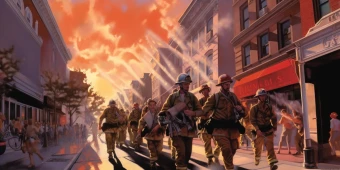by Flannery O'Connor


A Good Man is Hard to Find: Characters
Table of contents
- The Grandmother
- The Misfit
- Bailey
- June Star
- John Wesley
- Bobby Lee
- Hiram
- Red Sam
The Grandmother

The character of the grandmother in Flannery O’Connor’s short story "A Good Man is Hard to Find" is complex and multi-dimensional. On the surface, the grandmother appears to be a typical southern lady of her time, with her carefully chosen words, genteel manners, and old-fashioned clothing. However, upon closer examination, the reader discovers a character whose moral compass is deeply flawed, and whose actions lead to tragedy for her family.
At the beginning of the story, "A Good Man is Hard to Find", the grandmother is introduced as a self-centered, manipulative woman who is determined to get her way. She insists that the family change their travel plans and go to visit an old plantation house she remembers from her youth, despite the fact that her son, Bailey, has already made other plans. She even goes so far as to bring her cat along, despite Bailey’s protests, which ultimately leads to the car accident that sets the story’s tragic events in motion.
As the family continues on their journey, the grandmother’s behavior becomes increasingly problematic. She constantly criticizes her son’s parenting, berates her grandchildren for their manners and dress, and tells long-winded stories that are irrelevant to the conversation. Her sense of superiority and entitlement are evident throughout the story, and she seems to believe that her opinion should be the final word on everything.
Despite her flaws, the grandmother is not without moments of genuine kindness and compassion. She tries to comfort her granddaughter June Star when the child is upset, and she even attempts to reach out to the Misfit, the escaped convict who ultimately kills her family. However, these moments are often overshadowed by her selfishness and lack of empathy for others.
One of the most revealing scenes in the story occurs when the grandmother recognizes the Misfit and tries to appeal to his sense of decency by calling him a “good man”. The Misfit responds by saying, “I ain't a good man … but I ain't the worst in the world neither.” This exchange underscores the theme of moral ambiguity that runs throughout the story, and suggests that the grandmother’s rigid, black-and-white view of the world is misguided.
In the story’s final moments, the grandmother’s true nature is revealed. When faced with imminent death at the hands of the Misfit and his henchmen, the grandmother pleads for her life and begs the Misfit to pray with her. In this moment, she recognizes the value of her own life, and is willing to do anything to preserve it, even if it means betraying her family and the values she claimed to hold.
Overall, the character of the grandmother is a complex and flawed portrayal of a woman who is trapped by her own sense of entitlement and superiority. Despite moments of kindness and compassion, she ultimately brings tragedy upon her family, and is unable to redeem herself even in the face of death. Through her character, O’Connor offers a commentary on the moral ambiguity of the human condition, and suggests that true goodness is not as easily defined as we might like to think.
The Misfit

The Misfit is the main antagonist of Flannery O'Connor's short story "A Good Man is Hard to Find." He is a convicted criminal who has escaped from prison and is on the run with his companions. Despite his violent nature and criminal past, the Misfit is a complex character who elicits both fear and sympathy from the reader.
The Misfit is first introduced when the Grandmother reads about him in the newspaper and warns her family to avoid the area where he was last seen. Later on, the Misfit and his companions encounter the family on a desolate road and the story takes a dark turn. The Misfit's demeanor is calm and collected, but his words and actions reveal his violent tendencies.
Throughout the story, the Misfit engages in a series of conversations with the Grandmother that shed light on his character. He is well-spoken and intelligent, with a philosophical outlook on life. He believes that life is meaningless and that there is no such thing as right or wrong. This nihilistic worldview is reflected in his criminal behavior, as he sees no reason to conform to society's rules.
Despite his criminality, the Misfit is not portrayed as a one-dimensional villain. He shows moments of vulnerability and even remorse, which makes him a more nuanced character. When the Misfit talks about his time in prison, he reveals that he doesn't like to kill people and that it makes him feel bad. He also expresses regret for not being present when his father died.
The climax of the story comes when the Misfit orders his companions to take the family members into the woods to be killed. The Grandmother, who has been trying to manipulate and reason with the Misfit throughout the story, finally has a moment of clarity and recognizes the Misfit's humanity. She reaches out to him and calls him "one of my own children," prompting the Misfit to shoot her in the chest.
The Misfit's reaction to the Grandmother's gesture is significant in understanding his character. He is visibly shaken and expresses a sense of confusion, as if he doesn't know how to respond to the Grandmother's act of kindness. This suggests that the Misfit is not a purely evil character, but rather someone who has been shaped by his circumstances and experiences.
In conclusion, the Misfit is one of the most complex characters in "A Good Man is Hard to Find." He is a criminal and a murderer, but he also shows moments of vulnerability and regret. His nihilistic worldview and violent tendencies are tempered by his moments of introspection and confusion. The Misfit's character adds depth to the story and raises questions about the nature of morality and human behavior.
Bailey
Bailey, the son of the grandmother in Flannery O'Connor's "A Good Man is Hard to Find," is a character who is largely absent throughout the story. Though he is the driver of the family's car on their ill-fated trip, he is not given much description or dialogue, and his actions are often driven by the desires of the other characters, particularly his mother. However, there are a few key moments that reveal important aspects of Bailey's character and his relationship with his family.
One of the main traits that can be inferred from Bailey's actions is his lack of assertiveness. He allows his mother to manipulate him into changing their travel plans, despite initially expressing his desire to go to Florida instead of Tennessee. He also seems resigned to his mother's tendency to dominate conversations and make decisions for the family. When the Misfit and his accomplices arrive and threaten the family, Bailey is initially passive, making no attempt to protect his family or assert his authority as the head of the household. He only becomes agitated and takes action when his wife and child are threatened.
Another aspect of Bailey's character is his role as a father. Though he is not given much opportunity to interact with his son, John Wesley, or his daughter, June Star, it is clear that he cares for them deeply. When the Misfit first appears and threatens the family, Bailey is quick to reassure his children that everything will be all right. He also becomes visibly distraught when he believes that his son has been shot, and his emotional response to this event is one of the few instances in which his character is fully fleshed out.
However, Bailey's role as a father is complicated by his relationship with his mother. The grandmother's constant criticism and belittling of Bailey undermine his authority as a parent, and it is clear that he feels frustrated and trapped by her presence. At one point in the story, he even tells his mother to "shut up" after she suggests that he should have brought a gun on the trip. This outburst is one of the few instances in which Bailey stands up to his mother, and it reveals the extent of his pent-up frustration.
Overall, Bailey is a character who is largely defined by his relationships with others. He is a passive, somewhat resigned figure who allows his mother to dominate the family's decisions and conversations. However, he is also a caring father who is deeply affected by the threats to his family's safety. The tension between his roles as a son, a father, and the head of the household make him a complex and multifaceted character, despite his limited presence in the story.
June Star
June Star is one of the characters in Flannery O'Connor's short story "A Good Man is Hard to Find". She is the young granddaughter of the grandmother and Bailey's daughter. June Star is portrayed as a sassy and opinionated child who does not hesitate to speak her mind. She is one of the more interesting characters in the story, as her dialogue often reveals a great deal about the family's dynamics.
June Star is first introduced in the story as a young girl who is bored and unimpressed with the prospect of going on a family road trip. She is critical of her surroundings and the people around her, and her comments often add a touch of dark humor to the story. For example, when the family stops at a restaurant, June Star criticizes the owner's appearance, calling him a "monkey".
Despite her young age, June Star seems to have a deep understanding of the world and the people around her. She is quick to point out the flaws in other people, including her own family members. For example, when her grandmother tells a lie about the location of a house she remembers, June Star is quick to point out the falsehood. She is also critical of her own mother, who she says would not have made a good doctor.
While June Star's character is not fully developed in the story, her presence adds a layer of complexity to the family dynamics. Her comments and opinions reveal the family's flaws and foibles, and her frankness contrasts with the grandmother's attempts to present a façade of Southern hospitality and manners. Ultimately, June Star serves as a reminder that even the youngest members of the family are not immune to the darkness and violence that permeates the story.
John Wesley
John Wesley is the eight-year-old son of Bailey and the Grandmother's grandson. He is portrayed as a disrespectful and impolite child who lacks any sense of appreciation or gratitude towards his parents and grandmother. He is constantly questioning and challenging his family's decisions, particularly his father's, and shows a lack of concern for their safety or well-being.
Throughout the story, John Wesley is shown as a symbol of the younger generation's lack of respect for authority and traditional values. He is more interested in his own entertainment, such as playing on his phone, than engaging in any family activities or listening to his parents and grandmother. When the family decides to take a detour to visit an old plantation house, John Wesley shows no interest in the historical significance and instead complains about the lack of any fun activities.
Although he is a minor character in the story, John Wesley's behavior serves to highlight the generational divide between the older, more traditional values of his parents and grandmother, and the younger, more rebellious attitudes of the newer generation. O'Connor uses John Wesley to critique the breakdown of respect and values in modern society and the consequences that can arise from such a shift.
Bobby Lee
Bobby Lee is one of the Misfit's companions and one of the escaped convicts who come across the family in "A Good Man is Hard to Find". Although he is not a major character, he plays a significant role in the story as one of the Misfit's accomplices.
Bobby Lee is portrayed as a simple-minded, violent individual who is easily influenced by the Misfit. He is the one who carries the yellow shirt that the Misfit later puts on after he kills the Grandmother. He is also the one who retrieves the gun from the car that is used to kill the family. Bobby Lee's willingness to follow the Misfit's orders shows his lack of independent thought and his blind loyalty to his leader.
Despite his violent actions, Bobby Lee is not portrayed as a malicious character. He seems to be a follower rather than a leader and may not fully understand the consequences of his actions. This is shown when he expresses concern about leaving the children alone after the Misfit suggests they should be killed. Bobby Lee may be seen as a character who lacks moral agency, as he is easily manipulated by the Misfit and does not appear to have a strong sense of right and wrong.
Overall, Bobby Lee serves as a minor but significant character in "A Good Man is Hard to Find", portraying the dangers of blind loyalty and the consequences of following a violent leader.
Hiram
Hiram is a minor character in Flannery O'Connor's short story "A Good Man is Hard to Find." He is one of the two henchmen of the Misfit, who the Grandmother and her family encounter on their ill-fated road trip.
Hiram is described as a "chunky boy with a red sweatshirt" and is portrayed as being somewhat slow-witted. He is often seen following orders from the more dominant Bobby Lee and the Misfit himself. Despite his limited dialogue and actions in the story, Hiram's presence adds to the tension and unease felt by the family and the readers.
In the scene where the family's car is overturned in a ditch, Hiram is tasked with holding the baby while the Misfit and Bobby Lee deal with the rest of the family. He seems unsure of how to handle the infant and awkwardly hands it over to Bobby Lee.
Overall, Hiram's character serves as a symbol of the Misfit's power over his subordinates and the helplessness of the family in their encounter with him. Despite his limited role, Hiram's presence contributes to the sense of danger and unpredictability in the story.
Red Sam
Red Sam is the owner of the Tower restaurant where the family stops for lunch on their way to Florida. He is a symbol of the corrupt and decaying society that the Grandmother warns against. Red Sam is friendly with the family and strikes up a conversation with the Grandmother about how "a good man is hard to find." He laments the state of the world, saying that "it's no real pleasure in life." However, he is not above exploiting others for his own gain, as evidenced by his charging for the gas he sold to the family even though he had previously agreed to let them have it for free. Red Sam represents the hypocrisy and moral decay of the society, where people speak of the need for goodness but fail to act on it themselves.

- Instructions Followed To The Letter
- Deadlines Met At Every Stage
- Unique And Plagiarism Free


 It Ends with Us
It Ends with Us
 The Odyssey
The Odyssey
 The Things They Carried
The Things They Carried